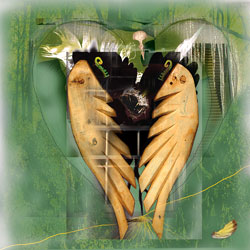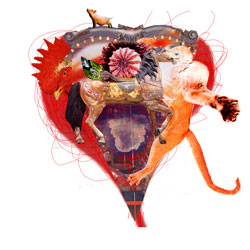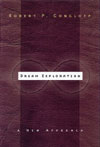
![]()
How to determine themes
Determining the theme of an event essentially involves observing the actions of the main character, or interactions of multiple characters, and identifying the essential point of the activity or the reason for the activity. You can facilitate this process by asking yourself these questions:
What basic activity is going on? (The action itself may be the theme.)
What is the major issue concerning the characters? (The issue being dealt with may be the theme.)
What is the apparent or presumed motivation of the characters that causes them to act in this way? What drives the characters’ behavior? Is it emotion? Is it an innate characteristic of the main character or characters? Is it the attitude the character or characters have about the main issue?
For example, let’s consider the following event, which could be a dream or something you might actually face in waking life. Let’s hope it is the former.
You are camping. A bear comes along. You run away.
Here are some suggested responses to the three basic questions that can lead us to a theme for this event:
What basic activity is going on? This event involves two characters, you and the bear. You obviously have certain plans that concern personal enjoyment. You do not necessarily plan involvement with others, especially not someone or something larger and more threatening than yourself. But you may consider this situation one in which you are overpowered and threatened. From the standpoint of your actions alone, you might consider a theme such as I have gotten myself into a situation I did not anticipate. From the standpoint of the interactions of the characters, you might say the theme is I am being overpowered by something larger or stronger than myself.
What is the major issue concerning the characters? From the standpoint of each character, the bear and the one running away, the issue is clearly that of two characters being in the same space at the same time, neither of whom may be particularly happy with the presence of the other. The theme in this case might be A confrontation occurs between two who are not used to being together, or A situation of potential conflict occurs.
What is the motivation of the characters? From the statement of the event as given, we can only surmise about motivation. For instance, we don’t know if you were being chased away by the bear or if you just ran in anticipation of being chased. Why did you not choose to scare the bear away? Or to fight back in some way?
All motivation can be described in terms of three types of energy: sensitivity, will, and intelligence.* When considering the prime motivation of characters, think in terms of these three broad categories.
Sensitivity. This category is motivation based on caring, compassion, love, or applied wisdom. Examples include expressions of unconditional love, caring and compassion, strong feeling and emotion, working in partnership, and using wisdom gained to help others.
Will. This category is motivation based on purpose, determination, or manifestations of power. Examples include using personal power and energy to meet challenges and fulfill personal visions, and expressing will to fulfill personal and shared desires.
Intelligence. This category is motivation based on thought, reason, and adaptability. Examples include dealing with and adapting to opportunities missed or fulfilled, analyzing, strategizing, communicating, and accepting responsibility.
Emotion can be a strong motivator. Did you react purely from emotion? If so, the emotion of fear may be the driving force in this event. An emotion can be a theme. Stated as a theme based on emotion, you might say I am in fear of being overpowered, or I react based on fear.
Exerting personal will? Seeking to fulfill desire is another prime motivator. A possible theme reflecting will and desire may be I am in a life and death situation, and choose life.
Using your innate intelligence by applying thought and reason is the third prime motivator. In this event, did you logically consider the options and decide some other place was the safest place to be? In this case, you might say the theme is I am under threat of being hurt, or I am avoiding pain, or I am running away from danger. If you think of motivation from the standpoint of the bear, you might say I am attempting to meet my basic survival needs.
These are all suggestions on ways to look at events and determine their core messages, their underlying themes. These questions, these ways of looking at an event, can help you determine the essential points of the event and the reasoning behind the activity. You need to decide for yourself which one is most appropriate for each event. As you examine each event, ask yourself what aspect provides the most impact for you? Is it the action going on between the characters? Is it the dynamics of the issues involved? Or is it what motivates the characters to act as they do, based on their emotion, will, or reasoning?
How to word themes
There is no rule as to the best way to state a theme. Themes can be stated as full sentences or as a single word. They can be stated as a question. For instance, the recommended theme I am in fear of being overpowered, is a full sentence. You may choose to word it Being overpowered, or just Overpowered. Or you may choose to state it as a question: Am I being overpowered?
The theme, A situation of potential conflict occurs, may also be worded I am in a situation of potential conflict. Or simply, Potential conflict. Stated as a question: Am I in a situation involving potential conflict?
In the discussion on determining themes above, suggested themes were offered. Under close examination, they can be seen to have three basic characteristics. First, they are all personalized. Most of them begin with “I.” Second, they are all written in the present tense, as if they were happening right now. For instance, most of them begin with “I am,” rather than “I was.” Third, rarely are words used in the theme statement that were used in defining the event itself. Following are suggested guidelines for wording themes using these three basic characteristics.
(1) Personalizing is the first basic characteristic of wording the theme.
When attempting to identify and determine themes, “characters” in an event can be anything. They are not just people. They can be inanimate objects. Or animals. This is because everything in our experience can be said to characterize some quality or energy. Many of our common expressions emphasize this: eats like a bird … a real wolf … peace dove … something’s fishy … latest flame … I’m floored … in a fog … ghost of a chance … good as gold.
Identifying with the object, personalizing it, calling the object “me,” allows you to see the quality or energy that you associate with that object as an aspect of yourself. You can ask yourself why this object is being presented to you at this time. And why in this context? Is this a quality that you need to be working with?
An example of an action character which we normally think of as an inanimate object is a car. Cars are extremely common in dreams. Many times themes can jump right out at you by examining the action of a dream car. Personalizing the car makes this even easier to see. Consider the following car-related themes. What is the impact to you when you see the word “I” or “me” included? What is driving me? I am in control. I am out of control. I am being chased. I am being transported. I am being protected from harm.
It is not important to focus on what an action character does in general, but what this particular character is doing in this particular situation, this waking life event or this dream.
(2) The second important characteristic of wording themes is to word them in the present tense.
In fact, it is also best to relate the event itself as if it were happening now, in the present. Why is this?
It is common to discuss an event or dream in the past tense. After all, it was something that happened in the past. But when we talk about it as a past event, we are less likely to own it and take responsibility for it as something we need to deal with right now. We are more likely to brush it under the table as something we don’t have to face. Often these events and dreams are presenting something to us that need to come to consciousness. By stating them as if they are happening at this moment, we are more open to experience all the dynamics and emotions that accompany the events.
By stating a theme in the present tense, such as, I am out of control, you can feel and accept the intensity of the message being presented. Stating it in the past tense, I was out of control, lessens the impact and allows you to imply to yourself that this is no longer an issue you need to face.
(3) The third characteristic of theme writing is perhaps the most important.
If you were to adapt rules for your theme writing, this would be the cardinal rule: avoid using the words and specific actions from the event or dream.
Themes are not always easy to determine. Therefore, our natural tendency is to simply restate the actions of the event. For instance, in the case of being chased across a mountain by a bear, your natural impulse might be to say the theme is Being chased. But considering your emotional state during this event, the theme is more likely, Fear of being overpowered. The theme based on the major issue at hand might be Under threat of being hurt. Your motivation is “avoiding pain.” Each of these statements avoids using the actual words and actions of the event.
By making it a rule to seek out new words and actions in determining a theme, you force yourself to get at the message the event is presenting to you. You get to its core, to the heart of the event.
Another example of this is a dream in which you are unable to lace your shoes. The title might simply be, “Unable to lace my shoes,” whereas the theme would be I can’t do a simple task.
Themes can be stated as full sentences, in a word or a few words, or as a question. Understanding themes comes easiest when they are personalized, stated in the present tense, and are not just reiterations of the words or actions in the event.
* Spiritual scholars may recognize these three types of energy as the first three of what is known as The Seven Rays. Ray one is will and power; ray two is love and wisdom, and ray three is intelligent activity. These three are said to constitute all of divine manifestation. Many books are available describing the Rays. The most authentic and informative of these are published by the Lucis Publishing Company, 120 Wall Street, New York, NY 10005.

Copyright Crista Cammaroto

Copyright Crista Cammaroto

Copyright Crista Cammaroto

Copyright Crista Cammaroto

Copyright Crista Cammaroto

Copyright Crista Cammaroto
Dream Exploration: A New Approach by Robert Gongloff. © 2020.
All rights reserved. Used by permission of the publisher.
